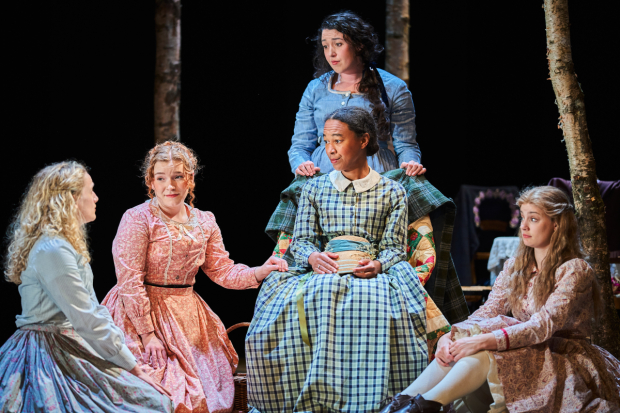”Little Women” at Pitlochry Festival Theatre – review

© Fraser Band
A huge part of the appeal of Little Women lies in the fact that it’s a nostalgia-fest; a gentle look back to a time long gone with different troubles to ours, but where (almost) everything works out okay in the end. Yet aspects of it also speak very directly to our time. Unusually for a 19th century novel, Louisa May Alcott’s story centres on a cast of strong-willed, independent-minded women determined to forge their own path in life. Some even spend most of the story refusing to conform to gender stereotypes. So with one eye on the past and one on the present, it should be perfect material for a theatrical adaptation.
So why did this version feel a little flat? Anne-Marie Casey’s new adaptation for Pitlochry Festival Theatre is pacey and full of life, trimming lots of the story’s fat and focusing on key characters and incidents so as to keep things moving in only two hours of action. (The story goes up to the end of Good Wives). Its appeal lies in its directness and its energy, and yet on stage it feels a little thin. That’s partly because much of the incidental material that gives the novel its sense of time and place has been removed. That might be a necessity, but using only eight actors for the whole story (with one doubling up as both John Brooke and Professor Bhaer) gives it a whiff of frugality it could have done without.
When you’re an ensemble company like Pitlochry’s, you work with what you’ve got, of course, and the cast do an admirable job. It’s an additional problem, however, that so many of the characters look the same age. When you can’t tell the oldest March sister from the youngest you lose an important thread of the story, and it’s worse when Marmee (Amelia Donkor, enunciating every word with passion and conviction) looks like their youngest sibling rather than a matriarch.
Ruari Murchison’s set doesn’t help: a domestic interior with tree trunks growing through it is a worthwhile attempt at versatility, but it poses problems of homogeneity that Brigid Larmour’s direction doesn’t solve. Furthermore, there are times when the story’s 19th century origin makes itself forcibly felt, and some of the moralising sounds robotic and out-of-place to our ears. Friedrich’s moral horror at Beth’s writing of sensationalist stories, for example, now strikes us as so dated that it’s prissy: why on earth shouldn’t a girl write pulp fiction if it pays the bills and, more importantly, she wants to?
None of this is the fault of the actors, who hurl themselves into their parts with terrific energy. Rachael McAllister plays Jo like the tomboy she is, though I wished her vulnerability had come to the fore a little more. Jessica Brydges and Anna Fordham play Meg and Amy with gentle directness, and Meg Chaplin makes the most of Beth’s angelic nature and her poignant departure. Tom Richardson plays both Brooke and Bhaer as the buttoned-up creatures of duty they are, and Richie Spencer’s Laurie is a bundle of wiry energy, bristling with life-force. Every so often Deirdre Davis swoops in as a formidable Aunt March.
So whether it’s due to the adaptation or to the source material, something in this show doesn’t quite cohere; but the ensemble cast makes it worth watching, and it kept me entertained regardless of the problems.










